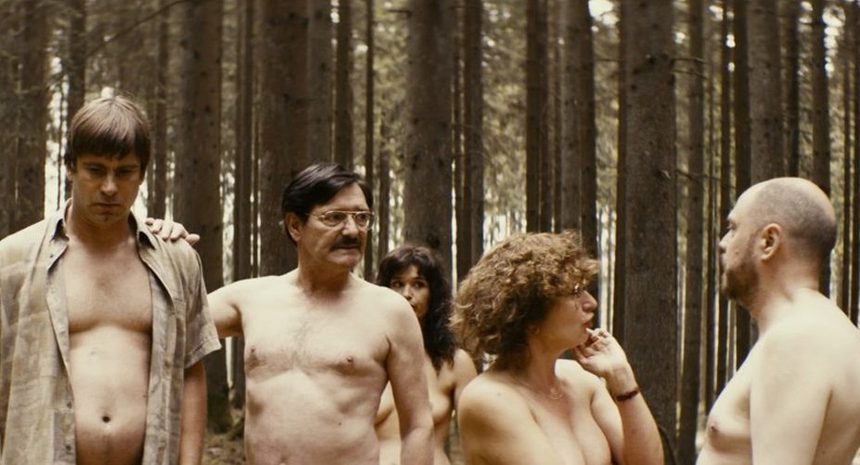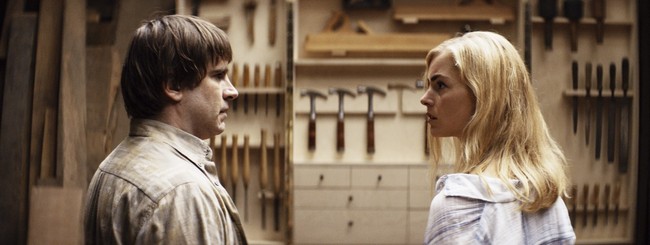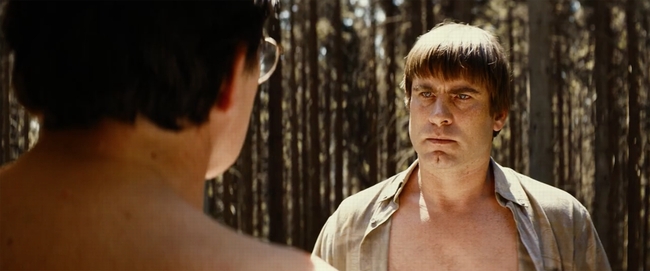Karlovy Vary 2019 Review: PATRICK, A Nudist Procedural Tragicomedy About Grief and Identity
Clothes do not make a man in Tim Mielants' procedural coming-of-grief dramedy,

Belgian director Tim Mielants carved a stable career on the small screen, including directing credits on high-end period horror series The Terror and crime drama series Peaky Blinders. However, he was missing a feature film to his name. That has changed.
Mielants shot a feature-length film with a story he claims he has been carrying in his head for several decades. Patrick had its world premiere in the main competition of the 54th edition of Karlovy Vary International Film Festival, where Mielants received an award for the best director, a good start for the maiden voyage on the festival circuit.
The eponymous protagonist lost his hammer. A simple and seemingly uneventful premise untangles into a peculiar kind of story. The titular protagonist is an almost middle-aged man running a nudist camp as the right hand of his elderly and constantly naked father. Patrick wears just a casually unbuttoned shirt no matter what he does.
He takes on handyman responsibilities among other duties while campers, a loyal crowd, consider him a harmless fellow. His sort of childish innocence and naivety puts him in the category of a village fool and man-child. Withdrawn in his own world and enjoying simple pleasantries such as carpentry, Patrick´s life takes a sour direction after his hammer (one out of the set of seven) goes missing. And his father dies.
Patrick´s obsession over the missing hammer is so intensive that it becomes clear he is unable to process raw emotions of grief. The film turns into an odd procedural as a fanatical pursuit for the lost tool unfolds. However, Mielants and his co-writer Benjamin Sprengers wittily employs the investigative plot to latently frame the five stages of grief.
As simple as the plot may look, Mielants directing feature debut is a carefully thought through. Patrick does not fall into the usual category of existential tragicomedies nevertheless it is one. After the death of the patriarch, the protagonist loses a sense of himself, leaving him in a crisis of identity while grappling with the future of camp and backstabbing.
Two unlikely camp visitors became guides to the naked path to self-discovery, an audacious rockstar, Dustin Apollo, played by Flight of the Conchords star Jemaine Clement in a small and mostly covered supporting role, and his girlfriend Nathalie, played by Hannah Hoekstra.
Patrick goes on a merry-go-round bumping into the campers on his investigative trail while Mielants implies that even people who have nothing to hide have something to hide. Thoughtfully, that is not the film's punchline but a narrative instrument, as the procedural turns out to be actually a veiled coming-of-grief, clothed as coming-of-middle-age.
Genre filmmaking intertwines with drama packing laughs and a few insights. In the heart of the naked romp lies a humanistic tale that may be too uplifting for its own good. Patrick swerves dangerously close to the corny territory. Mielants had doubtlessly good intentions however the saccharine feel-good dose appears to be administered as a direct antidote to grief and to widen the audience appeal. Because Patrick is an effort tailored for film clubs and mainstream arthouse.
Production designer Hubert Pouille and cinematographer Frank van den Eeden, who lensed a couple of The Terror episodes, recreated the spirit and the look of the 80s with, what appears to be, a nod to Danish sexcomedies. Naturally, German 70s porn mustaches abound; Herman, Patrick's antagonist who aspires to run the camp after Patrick's father moves on, sports the thickest one.
In one of the few slapstick scenes, Herman and Patrick get into a (naked) fight in a caravan. Mielants employs a considerably less ridiculous approach to choreography compared to Sacha Baron Cohen and Ken Davitian performance in Borat. The restrained approach to the comic side (and physical comedy scenes) elevates Patrick's tamer and sensitive moments of rumination, underscoring the topic of dignity in a world of ambitions (the camp) and corruption (the outside world).
The Belgian actor Kevin Janssens stars in the leading role as a semi-nudist 40-year-old-virgin shtick portraying the character as naïve and harmless as possible, a child in a man's body, and preventing any emotions to leak out as he processes the latest developments in his life. Janssens underwent a body change, including growing a beer gut and sporting a ridiculous bowl cut, so that his appearance lands in close proximity of Steve Pemberton's Royston Vasey personas, minus the creepy factor.
In the end, Patrick turns out to be a sweet procedural coming-of-grief dramedy delivering winged and motivational platitudes evading outright cliché form and served with a couple of chuckles. The film may not be a subversive attempt at happy-go-lucky life philosophy and Mielants does not court controversy in any way. At the core, Patrick remains an unobtrusive morality fable about one´s integrity and staying true to oneself.
(Note: The majority of the cast is naked throughout the whole running time while Mielants keeps the whole affair civil. Furthermore, it is hard to imagine what the director needed to do in order to bank on the decision to have a nude cast and what means would it even serve in this increasingly pornified culture and world.)
Even the dame of Czech New Wave, Věra Chytilová, employed nudity in The Expulsion from Paradise (2001) while nudity had been used in theatre as a staging method from Ibsen´s A Doll's House to Camus' Caligula. However, in Patrick, there is no avant-garde added value, just a simple take-out that clothes do not make a man but his actions do.
De Patrick
Director(s)
- Tim Mielants
Writer(s)
- Tim Mielants
- Benjamin Sprengers
Cast
- Kevin Janssens









